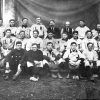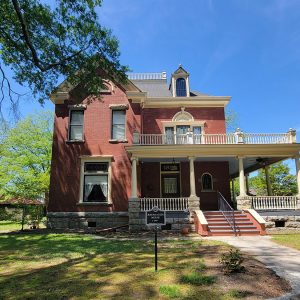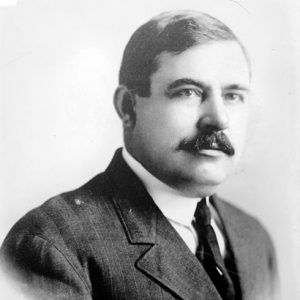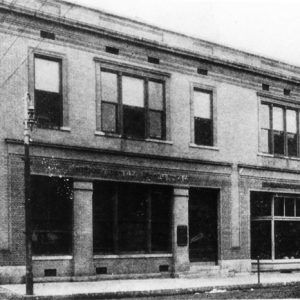calsfoundation@cals.org
William Marmaduke Kavanaugh (1866–1915)
William Marmaduke Kavanaugh was briefly a U.S. senator for Arkansas after the death of incumbent Jeff Davis. In addition, Kavanaugh also served as managing editor of the Arkansas Gazette from 1890 to 1896, sheriff and tax collector for Pulaski County from 1896 to 1900, probate and county judge from 1900 to 1904, and member of the National Democratic Committee from Arkansas from 1912 to 1915.
William M. Kavanaugh was born on March 3, 1866, near Eutaw in Greene County, Alabama, to the Reverend Hubbard Hinde Kavanaugh and Anna Kimbrough Kavanaugh; he was one of six children. His father was a minister in the Methodist Episcopal Church, South, and chaplain of the Orphans Brigade, which was the only Confederate brigade from Kentucky during the Civil War. Kavanaugh moved with his family to Frankfort, Kentucky, when he was young. He earned an MA from the Kentucky Military Institute in Farmdale, where he graduated in 1885 as a cadet officer, the highest ranking for a student. During his time there, he was roommate to F. B. T. Hollenberg, later president of the Hollenberg Music Company.
After graduation, Kavanaugh moved to Clarksville (Johnson County), where he worked for a local banker and merchant, Captain John C. Hill. He married Ida Floyd, the daughter of Judge W. W. Floyd of Clarksville and sister of William E. Floyd, postmaster of Little Rock (Pulaski County), on October 9, 1889. They had five children.
Kavanaugh moved to Little Rock in 1886 and began working for the Arkansas Gazette. In 1890, Kavanaugh was promoted to managing editor of the Arkansas Gazette after quickly working his way up from reporter. He held the position of managing editor until 1896, when he was appointed sheriff of Pulaski County by Governor James P. Clarke as a replacement for W. Horace Booker. After finishing out that term, Kavanaugh was elected to a second term. Kavanaugh later served two terms as probate and county judge beginning in 1900, during which time he built the road to Pulaski Heights (Pulaski County), facilitating the development of the Heights Residential Area. He also bought the land where the Pulaski County Courthouse stands today. Kavanaugh served as chairman of the County Central Democratic Committee after six years as a member. In 1912, he was elected national committeeman from Arkansas by the state convention and was a delegate to the national convention in Baltimore, Maryland. In 1913, Kavanaugh was elected by the Arkansas General Assembly to finish out the term of the deceased Democratic senator Jeff Davis.
Some have called Kavanaugh “Arkansas’ Foremost Citizen” due to his involvement in so many aspects of the state’s political, business, and social scene. He was president of the Little Rock Railway and Electric Co., president of the Natural Gas Supply Company, and president of the Consumers Coal Company. As treasurer of the Central Heating Company, Kavanaugh improved the system by changing it from hot water to steam heating. As a member of the Little Rock School Board for twelve years and president for six, Kavanaugh was responsible for erecting and improving Little Rock school buildings. As member of the National Association of Baseball Clubs representing the Western and Southern leagues he was called “the squarest man in baseball” by Captain C. T. Crawford. He was also director of the Lakes-to-the-Gulf Deep Waterways Association, director of the American Cities Company, president of the Little Rock Compress Company, president of the Quapaw Club, exalted ruler of the Little Rock Lodge No. 29 (B. P. O. Elks), and member of the famous McCarthy Light Guards. Kavanaugh was also responsible for organizing the Southern Trust Company and erecting the first modern office building in Arkansas, the Southern Trust Building, which is now Pyramid Place. He was also the chair of the citizens’ executive committee of Little Rock that planned the Confederate Veterans Reunion of 1911, dedicating much of his time and money to this cause.
Kavanaugh died on February 21, 1915, in Little Rock. The reported cause of death was apoplexy following an hour-long attack of acute indigestion. He is buried at Oakland Cemetery in Little Rock. More than 5,000 people attended the funeral service, during which time all state, county, and city offices, as well as banks in Little Rock, were closed. Public schools, the Arkansas Gazette, and many merchant houses also closed. In 1936, Kavanaugh Boulevard was named in his honor.
For additional information:
Arkansas Biographical Dictionary. St. Clair Shores, MI: Somerset Publishers, Inc., 1998.
“Kavanaugh Boulevard and the Man for Whom It Was Named.” Pulaski County Historical Review 16 (March 1968): 9–13.
“Kavanaugh Boulevard Is New Name for Prospect Avenue as Council Honors Former Judge.”
Arkansas Democrat. December 11, 1936, p. 27.
Memories of W. M. Kavanaugh. Little Rock: C. C. Kavanaugh, 1916.
Jaci Manning
Little Rock, Arkansas








Comments
No comments on this entry yet.